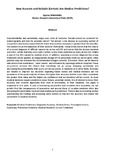| dc.description.abstract | Unpredictability and uncertainty reigns over most of medicine. Should women be screened for mammography and men for prostate cancer? The answer is not obvious as a growing number of researchers and doctors assert that the harm of preventive measures is greater than the benefits. Can patients trust the diagnoses of their doctors? Awkwardly, research has shown that the chance of a correct diagnosis of difficult cases to be as low as 5.8% and worse that the doctors involved were 64% certain that they were right. Further, a new study estimates as many as 400,000 deaths a year in the USA caused by medical errors. In addition, assuming a correct diagnosis the wrong treatment can be applied, an inappropriate dosage of the prescribed medicine can be given, while patients may not consume the recommended dosages correctly. Moreover, there can be harmful side effects from medication, “never events” and infections by superbugs while in hospitals. These occurrences increase the chance that something can go wrong, enlarging uncertainty and decreasing the predictability that a cure will be successful. In medicine as in other fields, forecasts are needed to improve our decisions regarding future events and medical decisions are not exceptions. In the great majority of cases, the higher their accuracy and the lower their uncertainty the greater their value and the higher our confidence that our decisions will be correct. As most medical decisions require predictions about future, uncertain events, it is of interest to know their accuracy and correctly appreciate their level of uncertainty, or their reliability. This paper is organized in two parts. It uses a forecasting perspective and considers how accurately we can predict first the consequences of preventive and second those of curative medicine while also discussing the uncertainty involved when making such predictions. There is also a concluding section summarizing the findings and proposing some actions to improve the accuracy and reduce the uncertainty in medical decisions. | en_UK |


